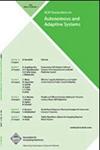An Analysis of Language-Level Support for Self-Adaptive Software
IF 2.2
4区 计算机科学
Q3 COMPUTER SCIENCE, ARTIFICIAL INTELLIGENCE
ACM Transactions on Autonomous and Adaptive Systems
Pub Date : 2013-07-01
DOI:10.1145/2491465.2491466
引用次数: 28
Abstract
Self-adaptive software has become increasingly important to address the new challenges of complex computing systems. To achieve adaptation, software must be designed and implemented by following suitable criteria, methods, and strategies. Past research has been mostly addressing adaptation by developing solutions at the software architecture level. This work, instead, focuses on finer-grain programming language-level solutions. We analyze three main linguistic approaches: metaprogramming, aspect-oriented programming, and context-oriented programming. The first two are general-purpose linguistic mechanisms, whereas the third is a specific and focused approach developed to support context-aware applications. This paradigm provides specialized language-level abstractions to implement dynamic adaptation and modularize behavioral variations in adaptive systems. The article shows how the three approaches can support the implementation of adaptive systems and compares the pros and cons offered by each solution.自适应软件的语言级支持分析
自适应软件在解决复杂计算系统的新挑战方面变得越来越重要。为了实现适应性,必须按照合适的标准、方法和策略来设计和实现软件。过去的研究主要是通过在软件架构级别开发解决方案来解决适应性问题。相反,这项工作侧重于更细粒度的编程语言级解决方案。我们分析了三种主要的语言方法:元编程、面向方面的编程和面向上下文的编程。前两种是通用的语言机制,而第三种是为支持上下文感知应用程序而开发的一种特定且重点突出的方法。这种范式提供了专门的语言级抽象来实现动态适应,并将自适应系统中的行为变化模块化。本文展示了这三种方法如何支持自适应系统的实现,并比较了每种解决方案的优缺点。
本文章由计算机程序翻译,如有差异,请以英文原文为准。
求助全文
约1分钟内获得全文
求助全文
来源期刊

ACM Transactions on Autonomous and Adaptive Systems
工程技术-计算机:理论方法
CiteScore
4.80
自引率
7.40%
发文量
9
审稿时长
>12 weeks
期刊介绍:
TAAS addresses research on autonomous and adaptive systems being undertaken by an increasingly interdisciplinary research community -- and provides a common platform under which this work can be published and disseminated. TAAS encourages contributions aimed at supporting the understanding, development, and control of such systems and of their behaviors.
TAAS addresses research on autonomous and adaptive systems being undertaken by an increasingly interdisciplinary research community - and provides a common platform under which this work can be published and disseminated. TAAS encourages contributions aimed at supporting the understanding, development, and control of such systems and of their behaviors. Contributions are expected to be based on sound and innovative theoretical models, algorithms, engineering and programming techniques, infrastructures and systems, or technological and application experiences.
 求助内容:
求助内容: 应助结果提醒方式:
应助结果提醒方式:


